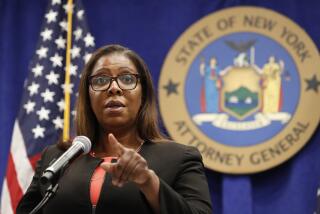A Dramatic Moment Delayed
- Share via
HOUSTON — Week 1 of the defense case in the Enron Corp. trial ended in anticlimax as defendant Jeffrey K. Skilling, widely expected to begin his testimony Thursday, still hadn’t taken the stand.
All the ingredients were in place for what promised to be the dramatic high point of the federal fraud and conspiracy trial: Media from around the country had converged on the squat downtown courthouse; legal commentators had tuned up their sound bites; “civilians” who wanted a ringside seat had taken up posts on the sidewalk at dawn; Skilling, Enron’s former chief executive, had pronounced himself eager to tell his story, and one of his sons and his first wife had come to the courtroom.
But as Thursday afternoon rolled around, it became apparent that questioning of former Enron General Counsel James V. Derrick would exhaust the full day. Because the trial runs on a Monday-through-Thursday schedule, that meant another weekend would pass before Skilling’s long-awaited testimony.
“I’ve waited five years. I think I can wait another weekend,” Skilling said outside the courthouse after Thursday’s session.
“Ideally, lawyers want to finish with a splash at the end of the week,” said Nancy B. Rapoport, dean of the University of Houston Law Center. However, she said, “you can never tell exactly how long a witness will take.”
If they couldn’t close the week with a bang, lawyers for Skilling and former Enron Chairman Kenneth L. Lay did begin marshaling testimony to support two of the big themes of their defense: that many government witnesses were coerced into pleading guilty to nonexistent crimes and that throngs of lawyers and accountants vetted the company’s financial statements, reviewed its deals and parsed the language that was used to disclose information to the public.
Skilling, 52, and Lay, 63, are accused of lying to the public about Enron’s financial health and participating in a scheme to hide Enron’s losses and improperly boost its reported earnings. Skilling also is accused of insider trading in Enron shares. The two face decades in prison if convicted of all charges.
The charges stem from a broad federal investigation launched as Enron lurched into bankruptcy in late 2001, wiping out thousands of jobs and billions of dollars of stock market wealth.
Skilling’s decision to testify is considered risky but probably necessary to his defense. One risk is that prosecutors will scour the lengthy statements he gave under oath to the Securities and Exchange Commission and Congress in 2001 and 2002 to find conflicts with what he says today.
Lay is also expected to testify during the trial, which began Jan. 30.
Lay’s defense effort has been disrupted by the illness of his lead lawyer, Michael W. Ramsey. Ramsey underwent surgery two weeks ago for a blockage in a coronary artery and returned to work last week but then suffered a setback. According to Lay’s spokeswoman Kelly Kimberly, the 66-year-old lawyer was scheduled to undergo another procedure today to implant a medicated stent, a device to prop open his carotid artery.
Derrick, Enron’s former head in-house lawyer, spent much of his testimony Thursday defending the way that the company and its outside law firm, Houston-based Vinson & Elkins, handled the complaints of Enron whistle-blower Sherron S. Watkins. Watkins had written a now-famous memo to Lay in August 2001 outlining what she saw as serious problems with off-the-books partnerships headed by Enron’s then-chief financial officer, Andrew S. Fastow, and warning that Enron could “implode in a wave of accounting scandals.”
Derrick, supporting testimony Wednesday by Vinson & Elkins partner Max Hendrick III, said Enron took Watkins’ complaints seriously and was satisfied with Vinson & Elkins’ investigation and its conclusion that the accounting treatment of the Fastow partnerships was aggressive but proper.
Co-chief prosecutor John C. Hueston, in cross-examining Derrick on Thursday and Hendrick the day before, attempted to show that Vinson & Elkins had done no more than a cursory examination of Watkins’ allegations, accepting at face value Fastow’s denial of impropriety and failing to interview key executives, including Skilling.
*
The Associated Press was used in compiling this report.
More to Read
Inside the business of entertainment
The Wide Shot brings you news, analysis and insights on everything from streaming wars to production — and what it all means for the future.
You may occasionally receive promotional content from the Los Angeles Times.








